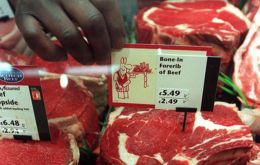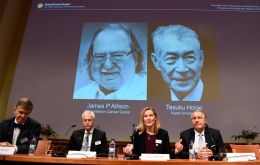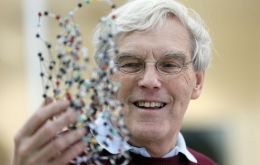MercoPress. South Atlantic News Agency
Tag: cancer
-
Wednesday, November 7th 2018 - 08:39 UTC
Lobbying in UK to impose a price-hiking “meat tax” to prevent 6.000 deaths annually

A price-hiking “meat tax” could prevent almost 6,000 deaths per year in the UK and save the economy more than £70 million in avoided healthcare costs, say researchers Globally, meat taxes could save an estimated 220,000 lives by 2020 and reduce healthcare costs by £30.7 billion, a study has found.
-
Tuesday, October 2nd 2018 - 08:43 UTC
Nobel Medicine Prize for harnessing immune system to fight cancer

James Allison from the United States and Japanese Tasuku Honjo won the 2018 Nobel Prize for Medicine for discoveries leading to new approaches in harnessing the immune system to fight cancer, the award-giving body said on Monday.
-
Monday, October 1st 2018 - 08:47 UTC
WHO kicks off global initiative to treat children with cancer

WHO has announced a new effort - the WHO Global Initiative for Childhood Cancer - with the aim of reaching at least a 60% survival rate for children with cancer by 2030, thereby saving an additional one million lives. This new target represents a doubling of the global cure rate for children with cancer.
-
Thursday, September 13th 2018 - 10:29 UTC
Cancer burden rises to 18.1 million new cases and 9.6 million cancer deaths in 2018

The International Agency for Research on Cancer (IARC) released on Wednesday the latest estimates on the global burden of cancer. The GLOBOCAN 2018 database, accessible online as part of the IARC Global Cancer Observatory, provides estimates of incidence and mortality in 185 countries for 36 types of cancer and for all cancer sites combined. An analysis of these results, published today in CA: A Cancer Journal for Clinicians, highlights the large geographical diversity in cancer occurrence and the variations in the magnitude and profile of the disease between and within world regions.
-
Friday, August 24th 2018 - 08:16 UTC
Monsanto glyphosate weed killer could cost Bayer billions in damage lawsuits

United States agro-chemicals company Monsanto is facing a surge in lawsuits that may cost its new owners, Bayer, billions in damages. Monsanto manufactures glyphosate-based weed killers which some believe are carcinogenic. Last month it lost a US$ 289m court case that alleged its products Roundup and RangerPro had led to a Californian man's terminal cancer.
-
Monday, June 4th 2018 - 08:42 UTC
New blood test could detect different types of cancer even in early stages

A new blood test shows promise for detecting many types of cancer, even in the early stages of the disease, according to a new study. In the study, researchers found that the test could detect 10 types of cancer and that it was 80 to 90% accurate for some cancer types. However, much more research is needed before doctors will be able to use the test on their patients, experts say.
-
Thursday, January 18th 2018 - 09:21 UTC
Advanced research shows how cancer cells interfere with DNA genetic instructions

“Incredible” images of DNA in action have been captured by scientists who will use them to design cancer drugs. Researcher Dr Alessandro Vannini said the pictures were “beautiful” and in artistic comparisons were “definitely a Van Gogh”, since they capture a fundamental part of all plant and animal life, called RNA polymerase III, reading the genetic instructions contained in DNA. It is a process that gets hijacked by cancer.
-
Wednesday, January 3rd 2018 - 09:52 UTC
AI system beats cardiologists and oncologists in detecting heart diseases and lung cancer

Researchers at an Oxford hospital have developed artificial intelligence (AI) that can diagnose scans for heart disease and lung cancer. The systems will save billions of pounds by enabling the diseases to be picked up much earlier. The heart disease technology will start to be available to NHS hospitals for free this summer.
-
Monday, January 4th 2016 - 09:27 UTC
Lifestyles have a greater impact on cancer suggest latest findings; likewise they might be more preventable

Earlier this year, researchers sparked a debate by suggesting that random cell mutations, rather than lifestyle choices, played a significant role in the development of tumors, a finding dubbed the “bad luck hypothesis.” A new study has nevertheless led scientists to believe that external influences have a far greater impact, implying that many cancers may be more preventable than previously thought.
-
Sunday, January 4th 2015 - 06:39 UTC
Most types of cancer traced to 'bad luck' rather than risk factors, say scientists

Most types of cancer can be put down to bad luck rather than risk factors such as smoking, a study has suggested. US teams were trying to explain why some tissues were millions of times more vulnerable to cancer than others.
